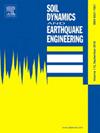考虑双模量效应的沥青混凝土核心堆石坝抗震分析
IF 4.2
2区 工程技术
Q1 ENGINEERING, GEOLOGICAL
引用次数: 0
摘要
在中国,随着抽水蓄能电站的广泛发展,沥青混凝土岩心堆石坝因其良好的变形适应性和抗渗性而成为首选坝型。在地震多发的中国西部地区,沥青混凝土岩心的抗震安全性尤为重要。然而,水利工程中使用的沥青混凝土材料在低温条件下的拉伸模量和压缩模量存在显著差异,而现有的构造模型并未考虑到这一点。本研究以动态拉伸和压缩试验为基础,建立了考虑沥青混凝土双模量效应的动态构造模型。利用该模型,研究了双模量特性对核心动态响应的影响。结果表明,双模量构成模型可以有效模拟沥青混凝土材料在低温下的应力-应变关系。与双模量模型相比,使用单模量模型进行计算会导致芯材的压应力显著下降,而拉应力大幅上升。具体而言,使用拉伸和压缩单模量模型可使拉伸应力最大分别减少 42.9% 和增加 336.8%。忽视双模量效应可能会导致对破坏区域的错误判断,因此不应忽视双模量效应对坝心抗震安全的影响。本文章由计算机程序翻译,如有差异,请以英文原文为准。
Seismic analysis of asphalt concrete core rockfill dams considering the bimodulus effect
In China, with the extensive development of pumped storage power stations, asphalt concrete core rockfill dams have become the preferred dam type because of their good deformation adaptability and impermeability. In seismic-prone western regions of China, the seismic safety of asphalt concrete cores is particularly important. However, asphalt concrete materials used in hydraulic engineering exhibit significant differences in their tensile and compressive moduli under low-temperature conditions, which has not been considered in existing constitutive models. In this study, a dynamic constitutive model considering the bimodulus effect of asphalt concrete was developed on the basis of dynamic tension and compression tests. Using this model, the influence of the bimodulus characteristics on the dynamic response of the core was investigated. The results indicate that a bimodulus constitutive model can effectively simulate the stress‒strain relationship of asphalt concrete materials at low temperatures. Compared with the bimodulus model, the use of the monomodulus model for calculations results in a significant decrease in compressive stress and a substantial increase in tensile stress of the core. Specifically, using the tensile and compressive monomodulus models led to maximum reductions in tensile stress of 42.9 % and an increase by 336.8 %, respectively. Neglecting the bimodulus effect may lead to misjudgment of the damage area, so the bimodulus effect on the seismic safety of dam cores should not be ignored.
求助全文
通过发布文献求助,成功后即可免费获取论文全文。
去求助
来源期刊

Soil Dynamics and Earthquake Engineering
工程技术-地球科学综合
CiteScore
7.50
自引率
15.00%
发文量
446
审稿时长
8 months
期刊介绍:
The journal aims to encourage and enhance the role of mechanics and other disciplines as they relate to earthquake engineering by providing opportunities for the publication of the work of applied mathematicians, engineers and other applied scientists involved in solving problems closely related to the field of earthquake engineering and geotechnical earthquake engineering.
Emphasis is placed on new concepts and techniques, but case histories will also be published if they enhance the presentation and understanding of new technical concepts.
 求助内容:
求助内容: 应助结果提醒方式:
应助结果提醒方式:


